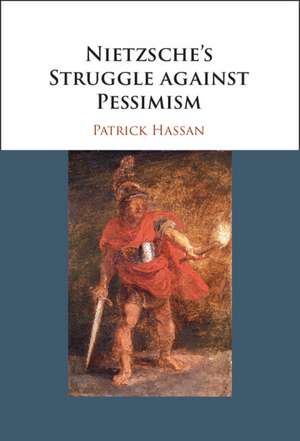Nietzsche's Struggle against Pessimism
Autor Patrick Hassanen Limba Engleză Hardback – 29 noi 2023
Preț: 593.04 lei
Preț vechi: 651.69 lei
-9% Nou
Puncte Express: 890
Preț estimativ în valută:
113.48€ • 118.72$ • 94.27£
113.48€ • 118.72$ • 94.27£
Carte tipărită la comandă
Livrare economică 02-16 aprilie
Preluare comenzi: 021 569.72.76
Specificații
ISBN-13: 9781009380270
ISBN-10: 1009380273
Pagini: 284
Dimensiuni: 236 x 159 x 23 mm
Greutate: 0.56 kg
Editura: Cambridge University Press
Colecția Cambridge University Press
Locul publicării:Cambridge, United Kingdom
ISBN-10: 1009380273
Pagini: 284
Dimensiuni: 236 x 159 x 23 mm
Greutate: 0.56 kg
Editura: Cambridge University Press
Colecția Cambridge University Press
Locul publicării:Cambridge, United Kingdom
Cuprins
Introduction; Part I. Nietzsche's Intellectual Context & Early Reception of Pessimism: 1. The varieties of pessimism; 2. Nietzsche's initial engagement with pessimism; Part II. The Beginnings of Change: Pessimism in Human All Too Human: 3. Nietzsche's new naturalism; 4. 'Bad news for priests': scientific progress and suffering; Part III. Nietzsche's mature rejection of the 'Pessimism of Sensibility': 5. A psychological critique; 6. An existential critique; 7. A perfectionist critique; Conclusion; Bibliography; Index.
Recenzii
'In place of a superficial acceptance or rejection, Patrick Hassan nuances in a fruitful and quite original way Nietzsche's critical engagement with the varieties and historical iterations of pessimism. A rare combination of historical erudition and analytic precision, this is an essential book on a core topic in Nietzsche studies.' Anthony Jensen, Providence College
'Nietzsche's critique of pessimism has often been framed as a response to Schopenhauer. Hassan usefully expounds the wider intellectual context and shows philosophical sensitivity in reconstructing the thought of the now-lesser-known figures that Nietzsche was in dialogue with, beyond just Schopenhauer.' Andrew Huddleston, University of Warwick
'Nietzsche's critique of pessimism has often been framed as a response to Schopenhauer. Hassan usefully expounds the wider intellectual context and shows philosophical sensitivity in reconstructing the thought of the now-lesser-known figures that Nietzsche was in dialogue with, beyond just Schopenhauer.' Andrew Huddleston, University of Warwick
Notă biografică
Descriere
A detailed account of Nietzsche's critique of pessimism is elucidated in its appropriate historical context, disentangling its various strands.
